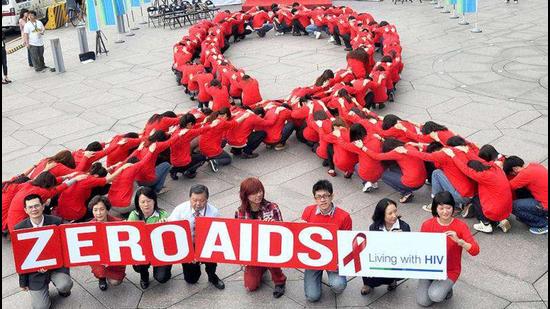Delhi health dept orders appointment of anti-discrimination officers for HIV
The Human Immunodeficiency Virus (HIV) and Acquired Immune Deficiency Syndrome (AIDS) Act, passed in 2018, prohibits discrimination against people living with HIV/AIDS and punishes the propagation of hatred or physical violence against them with up to two years in prison and a ₹1 lakh fine.
The Delhi health department has asked its offices to designate a representative to deal with complaints of discrimination against those with HIV/AIDS in accordance with a central law that came into force three years ago. Under this law, all offices — government and private — with more than 100 employees (20 in case it is a health care establishment) must designate such an officer.

However, not only has there been a delay in Delhi in appointing complaints officers within government offices, the state is yet to appoint an ombudsman — a person with quasi-judicial powers to take action against organisations discriminating against people with the viral infection.
The Human Immunodeficiency Virus (HIV) and Acquired Immune Deficiency Syndrome (AIDS) Act, passed in 2018, prohibits discrimination against people living with HIV/AIDS and punishes the propagation of hatred or physical violence against them with up to two years in prison and a ₹1 lakh fine.
“The government already provides treatment, While handing out the awards on the occasion of Teachers’ Day, Sisodia, who also holds the education portfolio, credited teachers for the success of students and government schools and encouraged them to apply for global training programmes to people with HIV/AIDS, as mandated by the Act. The complaints mechanism is one part of the Act and its implementation has begun,” said a senior official from Delhi’s health department.
According to the official, an ombudsman is yet to be appointed because the government needs to decide if a person will be picked specifically for the role or if an existing officer will be given additional charge.
“At present, we receive about one or two complaints in a quarter. This does not justify the need for having a separate office and a dedicated person as ombudsman; the government is debating whether it may be given as an additional charge,” the official quoted above said.
Organisations working with HIV/AIDS patients said an ombudsman has been appointed in just a few states, including Gujarat, Madhya Pradesh, Punjab, and Haryana.
“Barring these few states, the formation of the complaints mechanism is still in the pipeline, with some orders having been issued... Even after the mechanism is created, it will take some time for people to connect with it. We have to create awareness in the community,” said Daxa Patel, president, National Coalition for People Living with HIV in India (NCPI+) said
She added, “Currently, we refer people to the state legal services, national legal services, lawyers collectives, and some lawyers who have been working in the field. But they have to either go to the police or court. The formation of the mechanism will give people confidence that their complaints will be heard, without going to the court, and in a timely manner.”
Activists, however, say that without a proper complaints mechanism in place the government may not know the actual extent of the problem.
“The appointment of complaints officer in the government sector is a very small portion of implementation of the act. The Act states that any organisation, whether government or private, should have a complaints officer from within the staff. The onus is now on the government to ensure that these officers are appointed within private organisation as well,” said Raman Chawla, a lawyer and activist who works with HIV/AIDS patients.
He added, “And, a complaints officer does not have much power; they are just there to create pressure internally on the organisation to not discriminate against people with HIV. It is much more important to appoint an ombudsman as they can pass orders. It has to be a separate person with a properly funded office; not someone with additional responsibilities. Without a proper complaints mechanism in place, there is no way to tell how many cases of discrimination are there. The only recourse for people with HIV without the mechanism is to go to court; and most do not have the resource to do so,” said Chawla.
Hari Shankar, member of the executive board of Delhi Network of Positive People, said, “The reality is that on ground people do not even know about the Act, except for the activists. There are no complaints officers or state-level ombudsman. There was a meeting of Delhi government officials with the stakeholders after the bill was passed back in 2018, comments were sought. But since then nothing has happened.”
Stay updated with all top Cities including, Bengaluru, Delhi, Mumbai and more across India. Stay informed on the latest happenings in World News along with Delhi Election 2025 and Delhi Election Result 2025 Live, New Delhi Election Result Live, Kalkaji Election Result Live at Hindustan Times.
Stay updated with all top Cities including, Bengaluru, Delhi, Mumbai and more across India. Stay informed on the latest happenings in World News along with Delhi Election 2025 and Delhi Election Result 2025 Live, New Delhi Election Result Live, Kalkaji Election Result Live at Hindustan Times.






